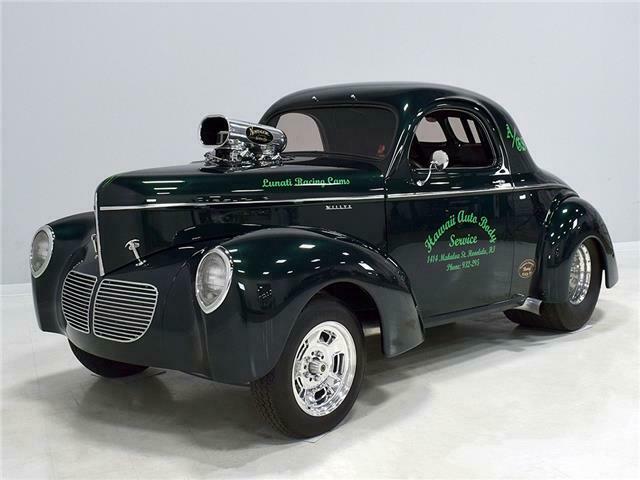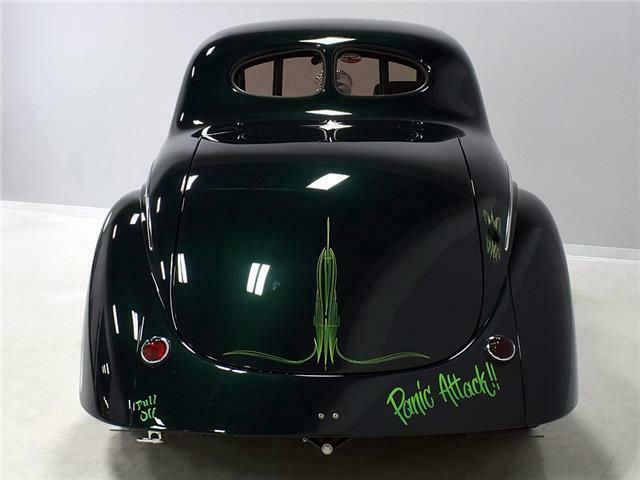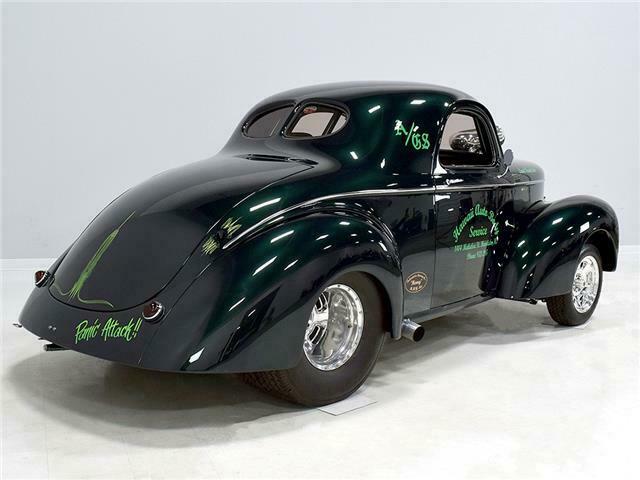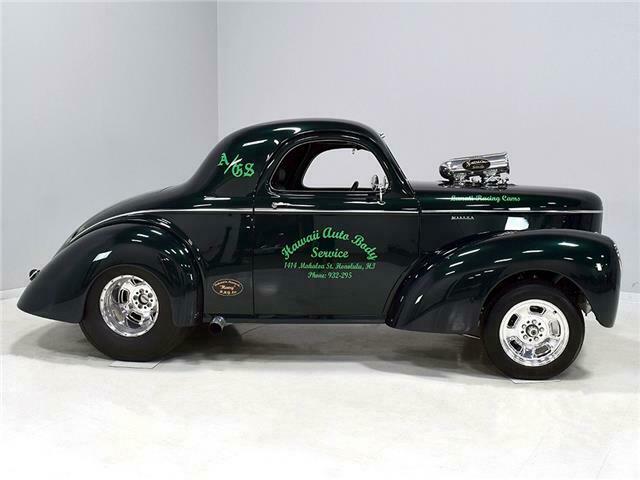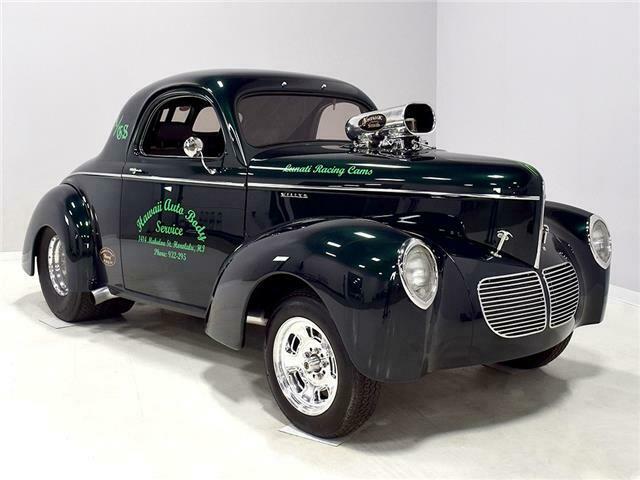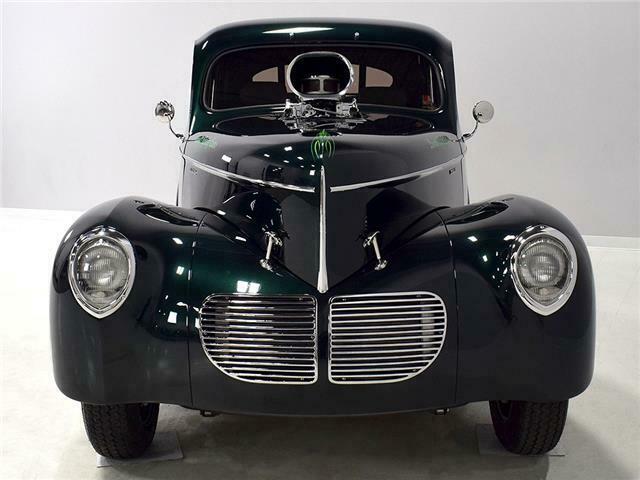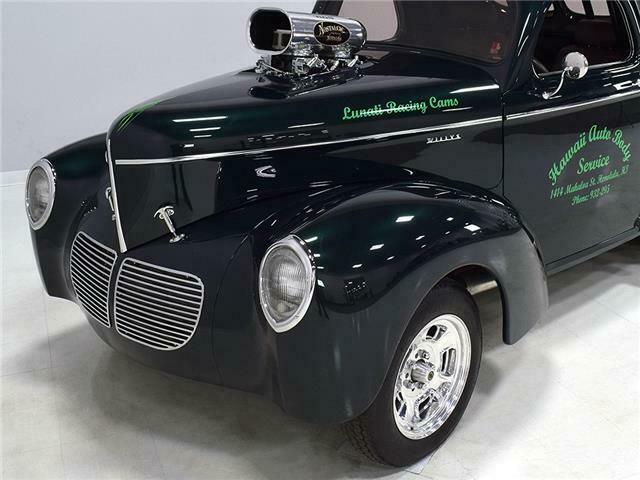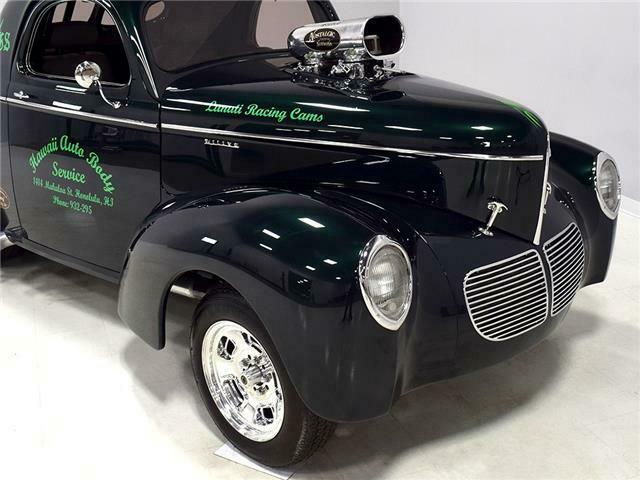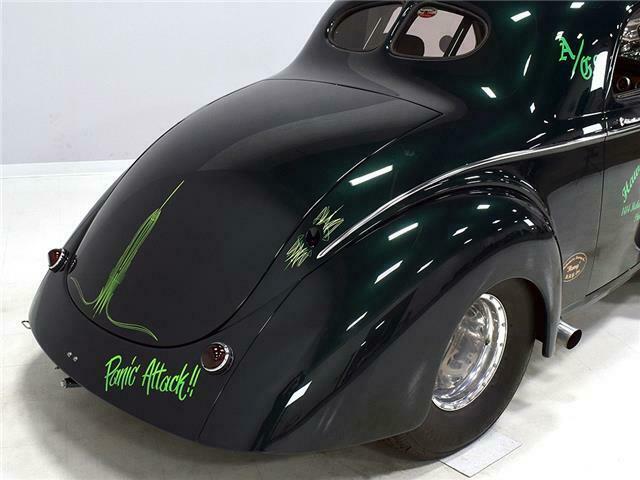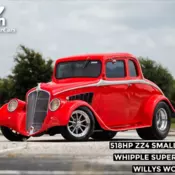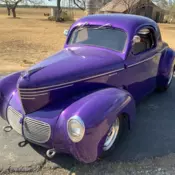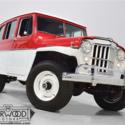1940 Willys Coupe 362 Miles PPG Prismatic Green 572 cubic inch supercharged V8
| Make: | Willys |
| Model: | Coupe |
| Type: | -- |
| Trim: | -- |
| Year: | 1940 |
| Mileage: | 362 |
| VIN: | W2724968 |
| Color: | Green |
| Engine: | 572 cubic inch supercharged V8 |
| Fuel: | Gasoline |
| Transmission: | Automatic |
| Drive type: | -- |
| Interior color: | Gray |
| Vehicle Title: | N/A |
| Item location: | Local pick-up only |
1940 Willys Coupe -- Additional Info:
Like most hot rod projects, this Willys didn’t start out to be a giant slayer but things kind of got out of hand. It started with an Outlaw Willys coupe body on a matching Outlaw fabricated chassis with boxed rails and plenty of reinforcements. Outlaw fiberglass is pretty darned nice stuff, but by the time this lovely green coupe was done in the body shop, it had racked up a $37,000 invoice for the show-quality PPG Prismatic Green finish. The... gaps are as good as it gets with a ‘glass car, the hood and trunk fit properly, and, well, we can’t really find any nits to pick with the way it’s put together. The lettering on the hood, doors, and B-pillar is all vinyl decals, so if you don’t like the look or would like something else, it all just peels off. We left it in place because we like the vintage racer look and because it isn’t advertising anything current—that’s a tribute to the builder’s hometown speed shop from the ‘50s. It certainly looks right and as I said, if you don’t like it, it’ll take you about 15 minutes to remove all the decals without any ill effects. Skipping the 8-point roll cage for a moment, you wouldn’t really realize that this is a full-tilt race car. The experts at Portage Trim stitched up the two-tone gray leather seats, which are Glide buckets with a lot of adjustability. You’ll find that this Willys coupe is a lot more spacious and comfortable than most of its kind because the guy who built it was well over six feet tall. Note the polished tilt column that hangs on an aluminum connecting rod, the custom-engraved horn button with the Willys logo on it, and the gently curving dash full of Auto Meter Pro-Comp liquid-filled gauges. It also offers a hand-built center console with the secondary controls and a ratcheting B&M shifter with line-lock. Look closely and you’ll see a functional Halon fire system, power windows, and even a Kenwood AM/FM/CD stereo system that sounds pretty good—as long as the thundering Donovan isn’t awake. The trunk is finished using matching materials, and while it’s not set up for carrying cargo, it looks great with a custom cover over the fuel cell and battery. It’s worth noting that everything works just like it should, and even though this is not a complex car, someone was sweating all the details; nothing feels loose, sloppy, or half-finished. We have receipts adding up to tens of thousands of dollars from Fowler Engines in Columbus, Ohio, who built the 572 cubic inch monster motor you see poking through the hood. The foundation is an all-aluminum Donovan block, which combines with a Cola steel crank and custom Lunati rods to create a bulletproof bottom end. If you’re familiar with Fowler, you know they are the supercharger specialists, so they whipped up one of their custom Littlefield 8-71 superchargers and parked it on top with a pair of 750 CFM Holley blower carbs. Lunati also supplied a full roller valvetrain, including a fairly stout camshaft that still has decent street manners and a 900 RPM idle, as well as a Mallory Hyfire ignition system. Oh, there’s also a set of Dart Super Mod aluminum heads to keep it all contained. It glitters from top to bottom and since everything under the hood is aluminum, it’ll look this good for years to come if you keep it tidy. The plumbing is all race-grade and you’ll note that there was probably a good chunk of change spent putting those matching green flames UNDER the hood. This engine was also expertly tuned and runs superbly; hit the fuel pumps, water pump, and ignition, then press the starter button. The big Donovan barks to life almost instantly and idles pretty happily at 1100 RPM. A few moments later, it’ll drop down to about 900 and it’ll stay there indefinitely. This is NOT a high-strung race engine that needs a lot of fretting—it was built for the street and acts appropriately. It is EXTREMELY impressive. Underneath, you’ll find a fabricated Outlaw Performance Pro chassis with boxed frame rails and built-in safety loops. The transmission is a custom-built TH400 3-speed automatic with a mild B&M 3000 RPM stall torque converter and reverse manual valve body, so it’s snappy and fun to drive on the street. The front suspension is a traditional chrome straight axle with coil-overs and a Vega steering box, as well as a set of big Wilwood vented disc brakes. In back, a custom-built Strange aluminum center section carries a nodular Ford 9-inch housing with surprisingly mild 3.89 gears on a Detroit Locker spinning Strange axles. There’s a polished stainless 4-link setup with coil-over shocks and a neat race-style sway bar to keep it lined up just right, and, of course, another set of Wilwood discs. Ceramic-coated long tube headers with 2.25-inch primaries feed a 3.5-inch stainless exhaust system with side exits and baffles, so while it’s ferocious, you won’t go deaf riding in it. Again, this car was built to be totally streetable. Traditional big-n-little Halibrand style wheels add to the old-school look and carry staggered Mickey Thompson rubber. Documentation is extensive, with every receipt, invoice, manual, and note included in a giant binder of information. If it went into the car, it went into the binder. We are extremely impressed by this Willys simply because it appears to mix race and show so effortlessly that it’s hard to believe. Yes, it’s a big hairy-chested brute, but it idles nicely, rides well, tracks like a cruise missile, and is comfortable for cruising. That’s always the goal, but most rods fall short of the finish line. Not so this Willys, and that’s what endears it to us. If this is your kind of car, you will not regret owning it because I guarantee you couldn’t have done it better yourself. Wow!

